Volunteer nonprofit groups are indispensable in helping cities keep their communities spruced up, but among that litter can be dangerous, discarded hypodermic needles.
As Snohomish County grapples with the spreading heroin epidemic, the Snohomish Health District Wednesday launched a new needle cleanup program to give residents and businesses kits that provide a simpler, safer way to clean up needles.
When district officials started seeing media reports following moms and kids around parks unsafely picking up needles as part of cleanup projects, “That made us very uncomfortable,” said interim health district administrator Jeff Ketchel.
“There are a lot of community groups that want to go out and clean up their parks, and we encourage that,” he said, “But we want them to be able to do it safely.”
The free kits include a reusable Sharps container, puncture-proof gloves, safety glasses, tongs, hand sanitizer and simple instructions for safe collection. The district is starting with 1,000 kits. They can be picked up from the Snohomish Health District at 3020 Rucker Ave. in Everett during normal business hours.
While cities such as Seattle have so-dubbed “needle ninjas” that people can call to come collect and dispose of needles, Ketchel thought there are better ways to use public dollars, thus the kits.
Ketchel talked at an Arlington City Council workshop Monday as one stop on a visit to funding partner cities to provide an update on health district activities.
Syringes left by drug users are showing up in parks, playgrounds, ballfields, trails and in isolated spots where drug users hang out.
While the risk of contracting a blood-borne disease such as hepatitis or HIV after accidentally being stuck by discarded needles is low, safe handling methods prevent further risk, district officials said.
District spokeswoman Heather Thomas said the resources aren’t available to retrieve needles, and the public wouldn’t be the first choice to do so, but since groups are already out serving their communities through cleanups, at least the district can equip them to do it more safely.
“This isn’t the perfect solution, but it’s a step in the right direction,” Thomas said.
Needle cleanup kits are the latest initiative in efforts to stop the county’s opioid crisis through treatment, prevention and awareness.
The health district this summer launched a new opioid resource website at www.snohomishoverdoseprevention.com that lists area treatment centers, shows how to make a needle safety kit at home, and shares the latest news in the fight against opioid abuse. The website also gives safety advice to drug users to help lower their overdose risk and seek help.
The district and city of Everett posted a brief training video on the website describing how to safely collect and dispose of used needles.
Thomas said they are looking at other locations to pick up the kits, and will post them to the website. The district will remain the sole location to drop off Sharps containers, and will accept only that type of container even if it wasn’t one they provided. Patients with syringes for other purposes must continue to dispose of them through their personal pharmacy.
Earlier this summer, the health district developed a wide medicine take-back program to dispose of pills at police stations and many pharmacies. Box locations are listed on the website.
On the opioid front, Ketchel also shared details about another new initiative to help secure prescription painkillers and other drugs from young people in the home or thieves.The district purchased 350 free lockable bank-like bags that can be set up either using a key or combination lock, which are being shared at community events.
Ketchel said if someone is sneaking them from a pill bottle, you aren’t going to know. If you keep them in a bank-like bag, you will know because the bag will be broken, torn or tampered with.
“We want people to secure their medicines at home, most importantly, and this is a great way to do it,” he said.



